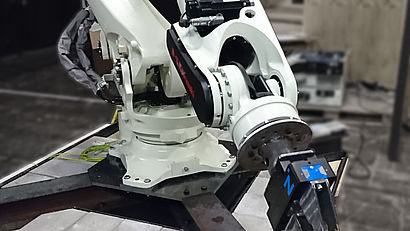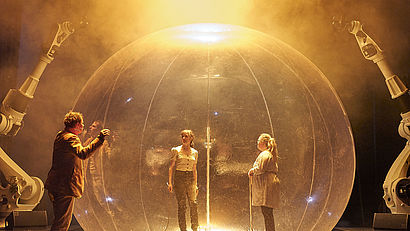How Kawasaki robots with Zimmer grippers caused a theater sensation
The opening scene of the play is reminiscent of the famous Terminator series by director James Cameron. While the actors of Hamburg's Thalia Ensemble deliver a brilliant performance, two robots come to life on the theater stage as dark music sets the tone. With extreme precision, they create a small forest on stage, piece-by-piece. The grippers do this by grabbing the material offstage and, with stoic tranquility, placing one artificial tree after another on the stage.
Restaged with a special attraction
For the remake of the famous play "Liliom" by Ferenc Molnár, the creative team led by director Kornél Mundruczó and set designer Monika Pormale have come up with something very special. In addition to the outstanding performers, two Kawasaki BX200X industrial robots, featuring two GPP5000 series grippers by Zimmer Group from Rheinau, Germany, play a "supporting" role in a rather literal sense. The plot of the play was reinterpreted, in part because of the robots. The original plot is summarized as follows: Liliom is a rascal and a heartthrob who is known as a barker at a Budapest fairground and as the lover of the carousel owner, Muskat. All this changes when he meets the love of his life, a maid by the name of Julie. He throws everything away and runs off together with her. When Julie becomes pregnant soon afterward, the couple faces enormous problems. Without work, money or an apartment, Liliom starts to beat Julie in his frustration and begins to drink. His shady friend, Ficsur, convinces him to take part in a robbery. The robbery goes catastrophically wrong and Liliom commits suicide. He spends many years in purgatory and is then allowed to return to the world, but the roughneck does not act like he has been reformed. In the age of #metoo, "no means no" and domestic violence, the viewer is confronted with the question of how to deal with a violent brute like Liliom. This is why director Kornél Mundruczó tells the story "backwards" in comparison to the original Hungarian play: Liliom is already dead and must face the judgment of God in heaven to answer for his deeds. It is a flashback to a different and distant time. Whereas in Ferenc Molnár's version, written in 1909, Liliom is given a second chance through a court in heaven and Julie herself absolves him at the end of the play, Mundruczó’s version features a "Safe Space" and a group of queer people (gays, lesbians, transgender people, etc.) whom he meets in the hereafter and has to answer to.
The robots take the spotlight
According to an old rule of theater, animals and children do not belong on stage, because they attract all the attention and outshine their fellow actors. Ever since the debut performance of Liliom, the two Kawasaki robots with their impressive Zimmer grippers now belong in this category too. Their monumental nature casts a spell on the audience from the very beginning. In addition to minor (but effective) stage interventions, such as setting up a grove of artificial trees or hanging up a prop moon (Fig. 1), the two steel stagehands also directly take part in what's happening on stage: In the suicide scene, the robots spray the protagonist all over with a kind of artificial blood to lend a particular dramatic impact to Liliom's violent death (Fig. 2). Their headlights and red navigation lights have the appearance of eyes that eerily stare at him as he is sprayed. And at the end, as the ensemble bows in front of the audience, the robots proudly lower their grippers and accept their applause. The theater audience is ecstatic, there are standing ovations—even for the robots—and the press also praises the play enthusiastically. “A great evening,” says Karin Fischer on Deutschlandfunk radio (August 18, 2019).
An idea becomes reality
But exactly how did they come up with this ingenious idea of integrating modern industrial robots, of all things, into this new interpretation of an old play? In a talk with Joachim Lux, the theater manager of Thalia Theater, technical director Hajo Krause shares some secrets. For the new and revolutionary stage design, Krause’s team approached two experts from the field of automation: That's how the company Kawasaki Robotics from Neuss, Germany came to loan two welding robots – the BX200X model – to the Hamburg theater company. The 1,500 kg BX200X model was developed for spot welding – such as in car manufacturing – and for tasks in handling. With a load capacity of 200 kg, a slim design, cable harnesses housed within the robot arm and a reach of 3,412 mm, the industrial robot combines effective performance with maximum flexibility. The two grippers were sponsored by the gripper specialist Zimmer Group from Rheinau, Germany. Fitting to the Kawasaki robot, Zimmer Group supplied two nine-kilogram, pneumatic long stroke grippers of the premium model GPP5030N, one for each robot. Thanks to their high gripping force of 5,000N, they are especially suitable for the special tasks that they handle on stage. At the same time, they also provide the necessary robustness and high flexibility for absorbing forces and torque.
Big challenges at the start
“At the beginning, we didn't know what we were doing because it was the first time," admitted Hajo Krause with a grin while talking with Joachim Lux, the theater manager of Thalia Theater, at a reception for the Hamburg premiere of the play. The risk taken by the team was not to be underestimated – especially in terms of the potential danger posed by the robots and their grippers. The two titans can squish a human being with ease and, for aesthetic reasons, there are no bars protecting the actors on stage against this.
This tricky dangers of this situation were successfully mitigated by several effective measures. For example, there is monitored access control with four cameras covering all areas inside and outside the action on stage. The robots move at reduced speed or operate at normal speed only when nobody is moving within the effective radius, and there are specifically defined areas that the robot can never approach. In addition, there is a staff member who is explicitly assigned to the task of closely watching all the movements on monitors. This person intervenes by initiating an emergency stop in case of danger.
The team also lacked the necessary programming expertise at the beginning. Thalia Theater’s event technician Emilie Piech had to acquire these skills in a 2-day basic training course at Kawasaki Robotics' EMEA headquarters in Neuss. Implementing the acquired skills was particularly challenging due to the fact that the two robots and the gripped objects being used had to be repositioned constantly, since they had to be completely removed after almost every performance on stage. To overcome this dilemma, small markers for the objects and the robots were set up on a dance floor so that it could be used like a template for further performances.
Last but not least, enormous time pressure hovered over the entire project like the Sword of Damocles. The first set rehearsal for the play was planned for just a few weeks later.
At the opening night reception, Hajo Krause and the theater manager of Thalia Theater, Joachim Lux, expressed their sincere gratitude to the two sponsors, Kawasaki Robotics and Zimmer Group, and affirmed that "the whole thing could not have been managed without the two companies.” According to theater manager Lux, "We were fully aware that we were taking a risk without knowing whether it would pay off in the end or whether it would work at all.” “Our understanding of artistic work is based on us saying that we always take risks. It is only when we take these risks that we can fail or perhaps even gain something new," he emphasized.
Taking the risk paid off. That much was proven by the audience's standing ovations at the end of the evening and the numerous, very favorable reviews in the media that followed.
The play is a co-production with the Salzburg Festival and has been running at the Thalia Theater in Hamburg since September 21, 2019. Thalia Theater, Alstertor / For tickets call +49 (0)40 328 14 444 or visit www.thalia-theater.de.


